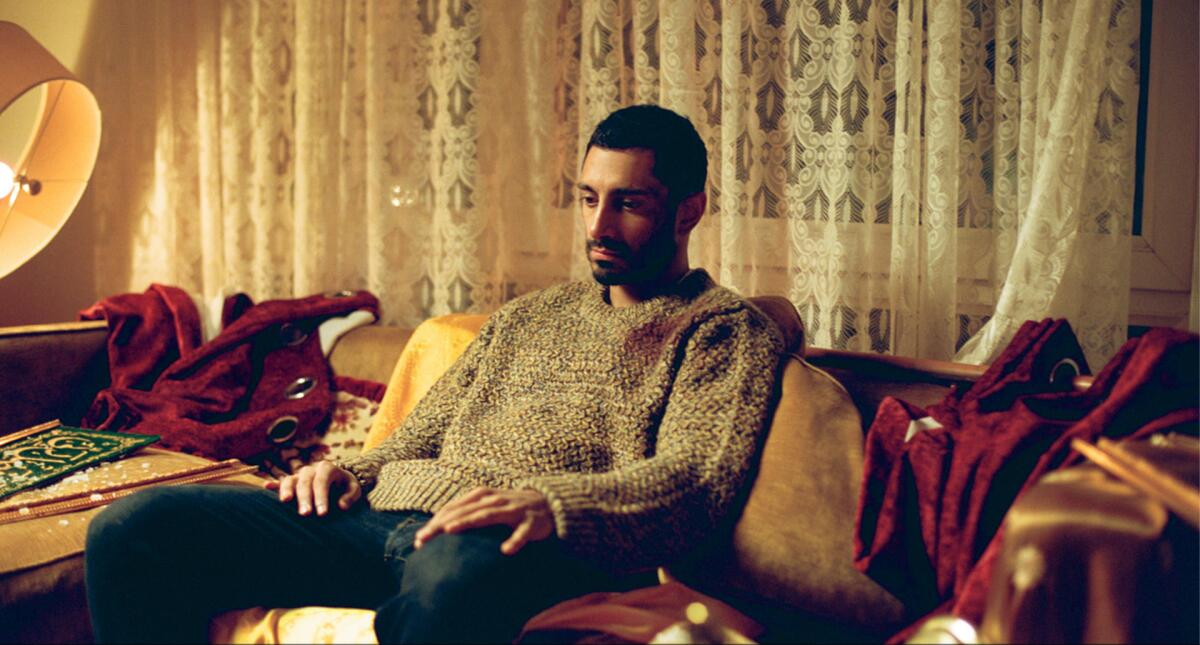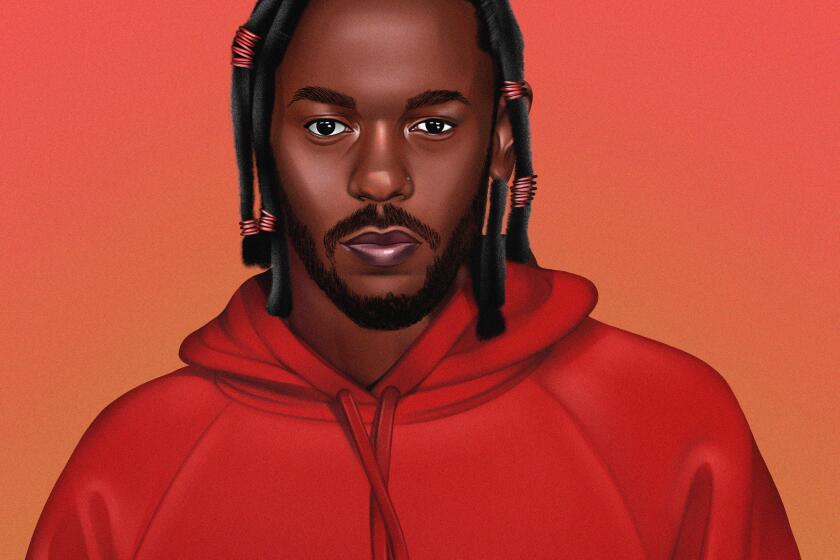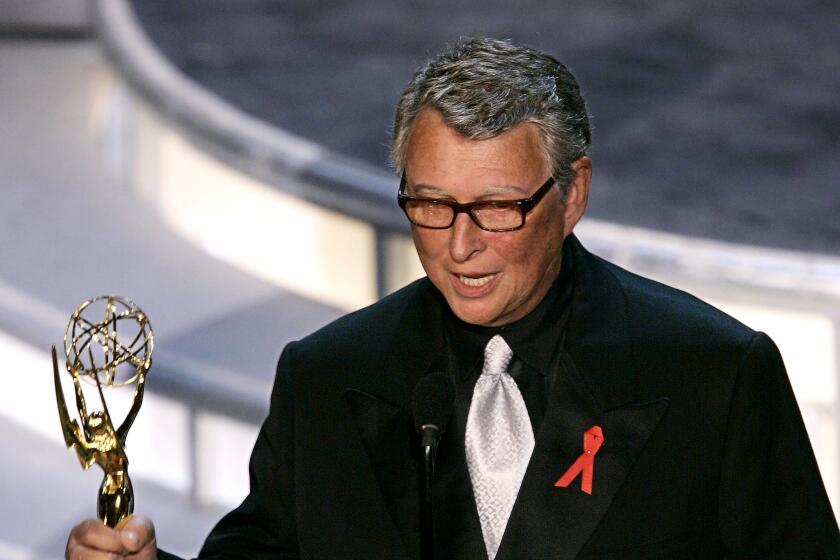Riz Ahmed on ‘The Long Goodbye’ and how sharing pain can help the healing

Riz Ahmed may not be kidding when he claims that Aneil Karia — Ahmed’s co-writer and director of the Oscar-nominated live action short “The Long Goodbye” — “hasn’t returned a single one of my text messages” since the awards announcement. The two are video chatting from separate London abodes and Karia seemingly has no defense. But then he is deep in pre-production on, presciently perhaps, the BBC-ViacomCBS series “The Gold.” The title references the famed 1983 Brink’s-Mat heist, in which loot worth an estimated $35 million was stolen from a London Heathrow warehouse.
The project may indeed prevent its director from participating in Oscar week events. “We start shooting the week before,” Karia says, understandably ruefully, “so I won’t be able to do the whole soak-it-all-up type thing,” but he’s hoping to make the main event at least.
Ahmed made history last year as the first Muslim nominated for lead actor, for “The Sound of Metal,” and he will likely be in deep Oscars-soak mode — he’s also an executive producer of three-time nominee “Flee,” itself a history-maker and which treads similarly hostile ground as his short film.
“ ‘Flee’ is a story about home and belonging and so many universal, profound things that cut to the heart of the human experience,” he notes, a description applying equally to “The Long Goodbye.”
Karia, who is of Ugandan, Indian, Irish and Welsh descent, and Ahmed, born to Pakistani parents, prefer to eschew labels and dispel notions that their nearly 12-minute movie is any sort of political animal. Yet they both admit finding “catharsis” in the project, which necessarily mirrors some of their own caustic experiences as brown men in Britain. But they choose to focus on the ominously named film’s hope and beauty, and their own evident brotherhood (they already have a feature in the works).
Opening on a South Asian family’s pre-wedding preparations, “The Long Goodbye” depicts the occasion’s loving if jittery planning — nerves induced by decor and dress, rather than any impending sense of the horror to come. It’s present day, or is it? The nightmare that unfolds might have felt dystopian a few short years ago but, made seven months after George Floyd’s killing, the film’s indeterminate timestamp only exacerbates its eventual, no longer futuristic horror.
Ahmed says that one viewer was “moved to tears” by the opening scenes of familial harmony — and tetchy disharmony. “Yes, tragedy and injustice exist, but so do these quotidian acts, of joy, love, tenderness and intimacy, and the film celebrates that. That’s a level of hope. Even if something is nightmarish or traumatic or unsettling, when you shape it into a story, it’s a hopeful act inherently, because what you’re doing is you’re saying this pain is still something I can hold in my hand. When I share it, it’s somehow less painful, and so there’s something in the storytelling that is healing and hopeful.”
He raves about Karia’s expertise, admitting he himself “didn’t understand how it would hang together, honestly, until Aneil showed me the edit. I trusted him, I know he’s a genius, but all the different things we were trying to do, I didn’t know if it would work.”
Karia recalls Ahmed’s presenting those “different things” — myriad tonal shifts incorporating horror, social realism, poetry and a striking breach of cinema’s fourth wall — as a question. “Riz said, ‘Would you like to make something that doesn’t take that kind of methodical, strategic development brief — that basically is just a product of how we’re feeling right now, that comes from somewhere much more personal?’”
Karia notes that such a “gut-led process” is one he always finds “preferable” in his directing work, which also includes the acclaimed 2020 BBC film “Surge,” starring Ben Whishaw, and the last three episodes of the London-set Netflix drama “Top Boy,” headlined by Ashley Walters and rapper Kano.
Fittingly, given that “The Long Goodbye” shares its name with accomplished rapper Ahmed’s searing March 2020 album, the film wraps with his piercing wound of words, which Karia terms “a beautiful monologue, or soliloquy, or poem.” In truth, it is all three, delivered as the watcher reels from a preceding nightmare, which concludes in a literal loss of light as the screen goes black, with perhaps a glimmer of hope.
The winter solstice shoot spanned only two days — Dec. 21-22, 2020. “Literally, you can’t get shorter days,” Karia says with a laugh, “and the style I always lean into is available light and naturalism, so we really created a rod for our own backs.” Ahmed’s final performance piece actually saw the sun set on it, rendering that footage “just on the line of being usable.”
Whether they steal the gold at the Oscars or not, the pair believe they have already won. Karia echoes both their views in concluding, “That same mess that was in our heads was clearly in thousands of other people’s heads. Us trying to distill that into this film was deeply meaningful to way more people than we thought. And that was very, very moving to us.”
More to Read
From the Oscars to the Emmys.
Get the Envelope newsletter for exclusive awards season coverage, behind-the-scenes stories from the Envelope podcast and columnist Glenn Whipp’s must-read analysis.
You may occasionally receive promotional content from the Los Angeles Times.








